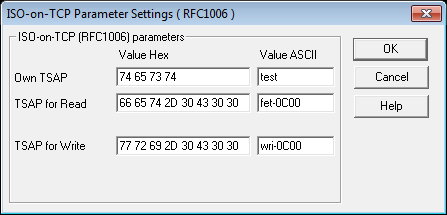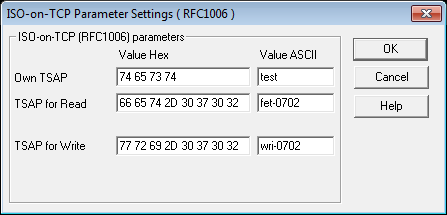IBHNet:Fetch/Write
From IBHsoftec Wiki English
With the IBH Link S7++ and the IBH Link S7++ HS, it is possible to establish Fetch/Write connections to S7 PLCs. Many HMIs support the protocol Fetch/Write over ISO-on-TCP (RFC1006). For this reason no additional driver is required.
In the HMI software only the TSAPs (Transport Service Access Point) have to be set up correctly. In order to establish Fetch/Write connections, it is necessary that the TSAPs contain only ASCII characters. A correct TSAP follows the rules below:
| TSAP syntax | |
|---|---|
| 0-27 user defined characters | The last 4 characters are reserved for MPI® addresses from 00 to 7E and Rack / Slot number 00 to FF. |
| Example: | |
| fet-0202 | The TSAP contains the user defined characters "fet-", the MPI®/Profibus address "02" and the Rack/Slot number "02" for Rack 0, Slot 2. |
| wri-0803 | The TSAP contains the user defined characters "wri-", the MPI®/Profibus address "08" and the Rack/Slot number "03" for Rack 0, Slot 3. |
| 0704 | The TSAP leaves the user defined characters away and contains only from the MPI®/Profibus address "07" and the Rack/Slot number "04" for Rack 0, Slot 4. |
| 0602 | The TSAP leaves the user defined characters away and contains only from the MPI®/Profibus address "06" and the Rack/Slot number "02" for Rack 0, Slot 2. |
- To connect to a S7-200®, Rack 0 and Slot 0 need to be used.
- Fetch and Write can also be used with a single TCP connection, if the client supports it.
- In the sample for the INAT server, a S7-200® with MPI® address 12 is used.
- A S7-400® with MPI® address 7 and slot 2 with the INAT Server will be configured as shown.

